- Details
- Written by: Kamran Mofid
- Hits: 2219
"What humbugs we are, who pretend to live for Beauty,
and never see the Dawn!"- Logan Pearsall Smith
“Day’s sweetest moments are at dawn”
'How to Make the Most of Your Day: Wake up With the Sun'
Louis Armstrong - What a Wonderful World Lyrics HD
Oh, What A Beautiful Morning w/Lyrics

Photo: How to Make the Most of Your Day: Wake up With the Sun
"In the morning, everything is new.
The day's blank slate lies before me,
ready for my writing.
May it be words of beauty I write.
May it be deeds of grace I do.
May it be thoughts of joy I think.
All the Holy Ones, Listen;
this is what I pray.
Great Spirits of the Four Realms,
Holy Ones of the Realms of Minds,
Kindreds of Yore,
as I go through the day,
keep my eyes open wide.
May I not miss beauty.
May I not miss joy.
May I not miss wonder.
Keep me awake and aware of the world.
It is my privilege to perform my morning prayers.
It is my honor to do what should be done.
As I rise with the morning, fog lifting slowly for my mind,
I pray not to forget these truths. Awen."- Ceisiwr Serith, Book of Pagan Prayer
When is the Dawn?
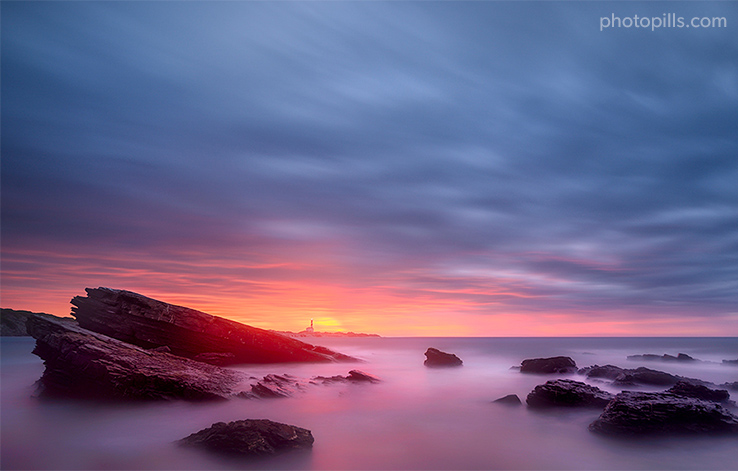
“How can we determine the hour of dawn, when the night ends and the day begins?” asked the Teacher.
“When from a distance you can distinguish between a dog and a sheep” suggested one of the students.
“No” was the answer.
“Is it when one can distinguish between a fig tree and a grapevine?” asked a second student
“No” “Please tell us the answer then.”
“It is, then,” said the wise Teacher, “when you can look in the face of a human being and you have enough light to recognize in him/her your brother/sister. Up till then, it is night and darkness is still with us.”-Hasidic Tale
The Inner History of a Day
‘No one knew the name of this day;
Born quietly from deepest night,
It hid its face in light,
Demanded nothing for itself,
Opened out to offer each of us
A field of brightness that traveled ahead,
Providing in time, ground to hold our footsteps
And the light of thought to show the way.
The mind of the day draws no attention;
It dwells within the silence with elegance
To create a space for all our words,
Drawing us to listen inward and outward.
We seldom notice how each day is a holy place
Where the eucharist of the ordinary happens,
Transforming our broken fragments
Into an eternal continuity that keeps us.
Somewhere in us a dignity presides
That is more gracious than the smallness
That fuels us with fear and force,
A dignity that trusts the form a day takes.
So at the end of this day, we give thanks
For being betrothed to the unknown
And for the secret work
Through which the mind of the day
And the wisdom of the soul becomes one.’-John O’Donohue
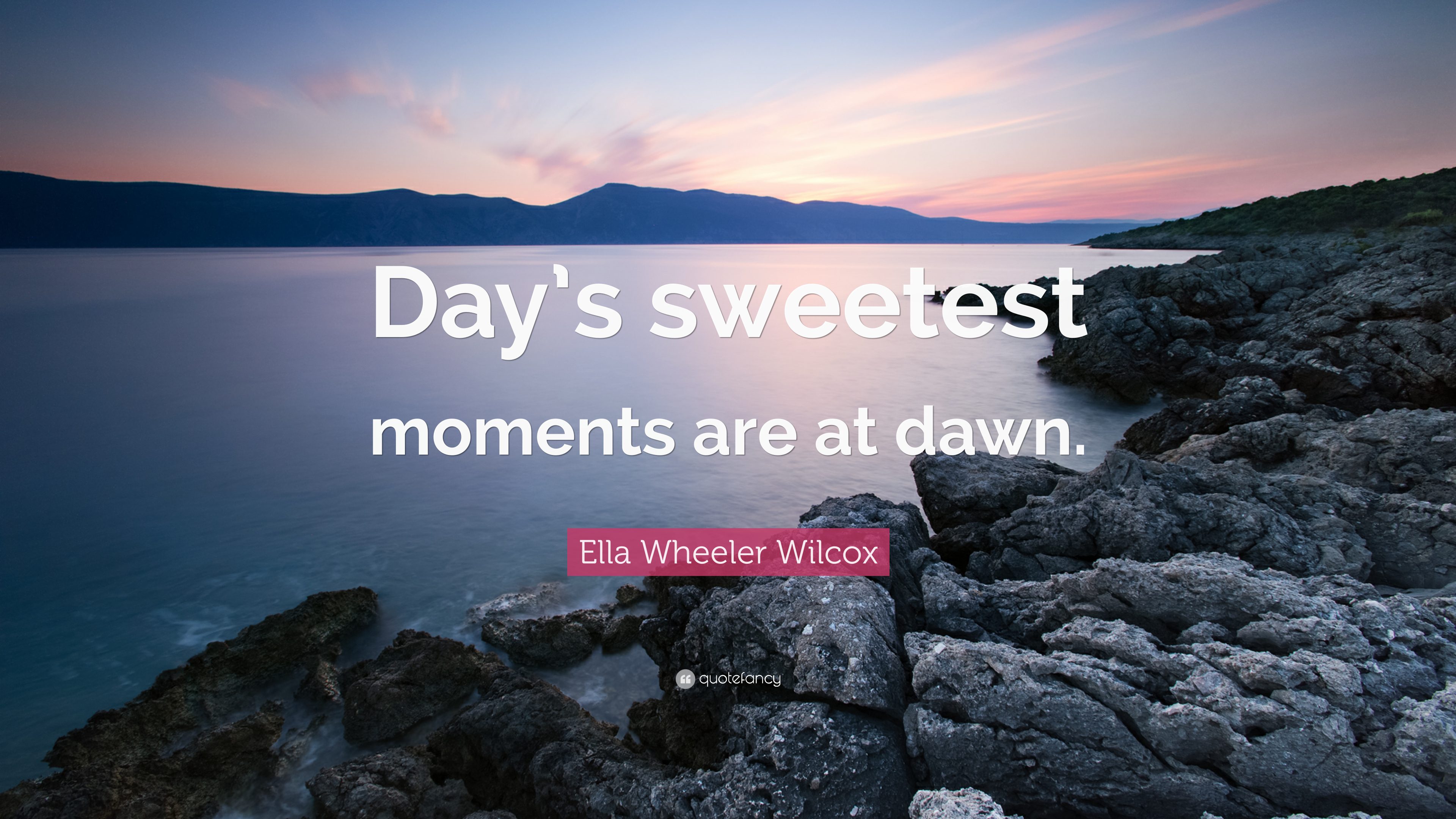
'The sweetest part of dawn is the silence before the chorus, the moment after; the song thrush and the blackbird first up and then the great tits and the sparrows all asking, where is the sun? They build their nests with their eyes on the horizon soften the twigs with egg-safe star stitched moss and the pull of lamb’s wool plucked fresh from the barb they spin it with the hope of golden thread, good yarn.
Gaia sits at her window and looks out beyond the communal garden waits for the light to reveal itself its fingers running through the drying remains of last year’s harvest, the ribbons of greenery chasing the hill through the wasteland and down toward the forest.
If she stands on her flowerbed she can see the needling floor the carpet of wood anemone and the curls of wild scent garlic, sees the eyes of a tiny deer his fresh infant antlers gleaming as he steps across the treeline into path blockers, shin catchers, he calls out, hear this...'-Natasha Carthew,'Hope's heart beats'
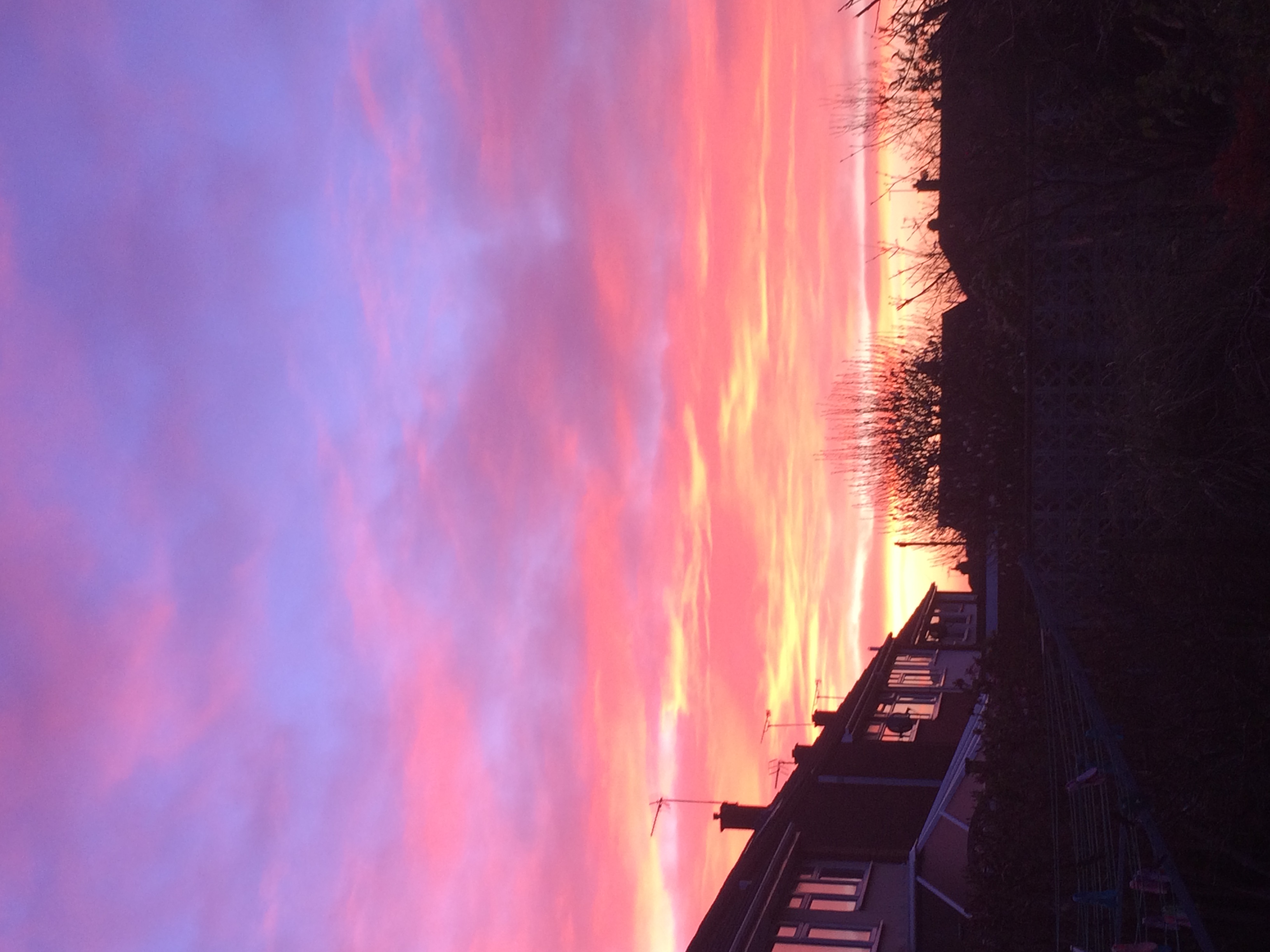
A beautiful sunrise from our garden in Coventry. April 2020. Photo: Anne Mofid
N.B. Over 20 years ago, I had a turning in my life.
I was facing some big challenges of life’s ups and downs, hopes and hopelessness. My mind, my feelings and emotions were not in harmony with my usual self. It was a painful time. Until, a very dear friend, a loving friend, a wise teacher, encouraged me to get up early in the morning, at dawn, just before the sunrise. He told me Kamran, you will see a different world, a better world, a kinder world, a healing world at that time of the morning. You will see the clouds dancing, the birds singing, the sky changing. You will see the dawn of a better life that you are searching for…
I rose to the challenge my friend has set for me. My life changed. I became the same Kamran as I used to be.
Now, this is the challenge I am setting for you, my dear friends. Please read what I have noted below. Be inspired by it. Then, on this coming Sunday- 26 April 2020- put your alarm clocks on to wake up at 5.00am (your local time) and join me (hopefully with a cup of lovely tea in your hand) and be with me in the spirit of oneness. Feel the Dawn moment, the sunrise, change of colours, the awesome Dawn chorus and more. Feel these changes, feelings and emotions, positivity, hopefulness, gratitude for being alive, seeing so much beauty and wonder.
Then, I invite you to write me a short note, up to 200- 300 words, telling me of your experience of this new awakening, engaging and dialoguing with the creator and creation.
I will then publish all that I have recieved on the GCGI website, so that together we may encourage a more fruitful global dialogue on ‘The healing power of the life-giving ‘Dawn’ at this time of coronavirus crisis’ and beyond.
The coincidence of the coronavirus arriving at the changing of the seasons seems like a cruel twist. But, in fact, to my mind, this will help us all spring back from this calamity, moving from despair to hope; darkness to light, and winter to spring.
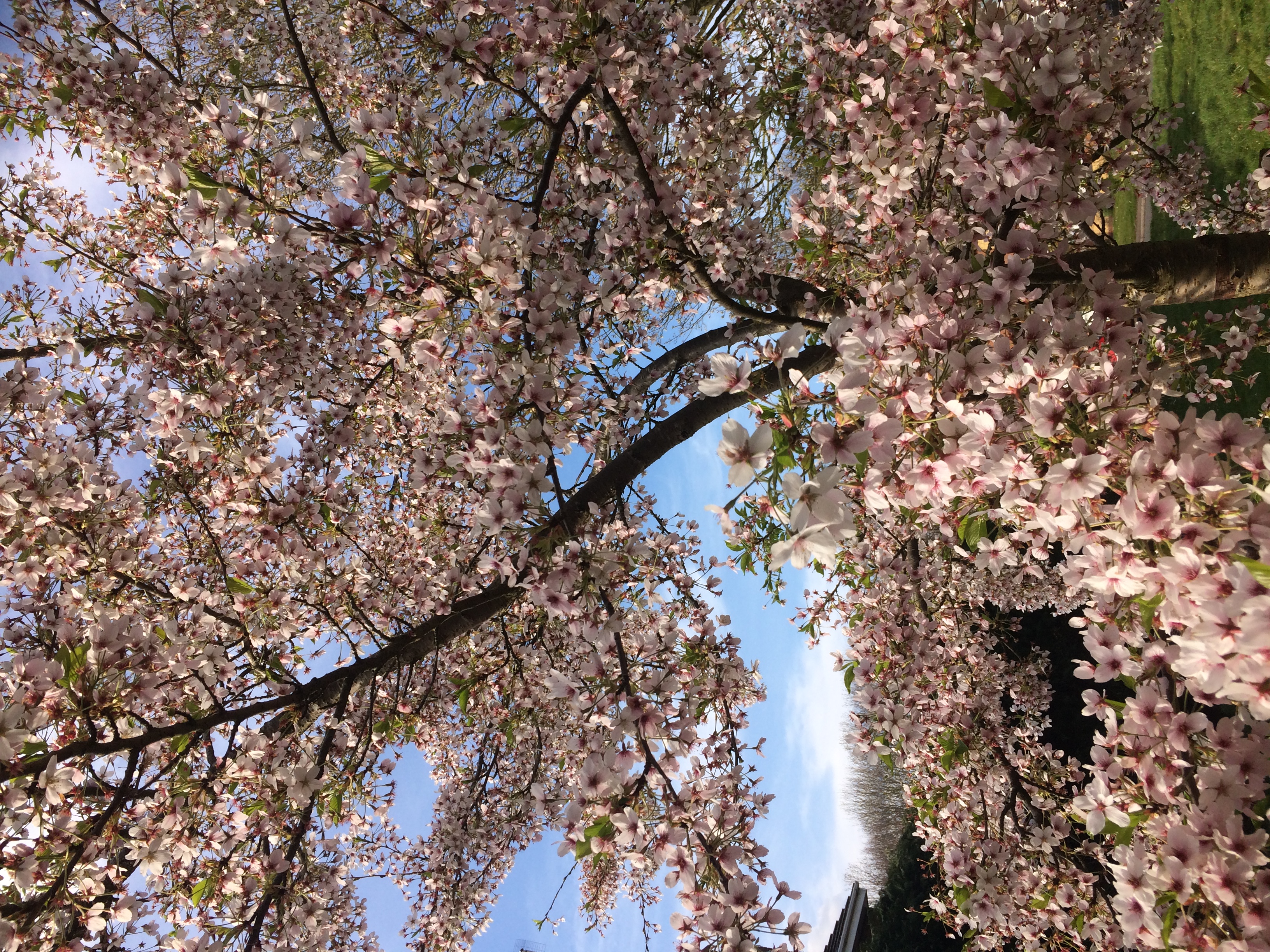
Beautiful cherry blosoms, our street, Coventry, April 2020. Photo: Anne Mofid
‘It's times like these you learn to live again
It's times like these you give and give again
It's times like these you learn to love again
It's times like these time and time again
I—I'm a new day rising
I'm a brand new sky
To hang the stars upon tonight’ - Dave Grohl, Foo Fighters
In times like these, we need an antidote so that we can keep our positive attitude and march forward with determination and hope. Be deliberate in activities that are positive, heartwarming, stress reducing and laughter inducing! We can do all these and more, if we begin the day in a beautiful, inspiring way. Hence, my message of loving Dawn and the wonders of the sunrise.
Together, we’ll get through this.
In Praise of Dawn and the Life-giving Sunrise
The Dawn, the time of the sunrise, a magnificent, precious and timeless time of day. It is an awakening of the planet, birds, trees, and wildlife. It is always a new beginning. This is the moment of unity, between you and the world of creation, you and Mother Nature.
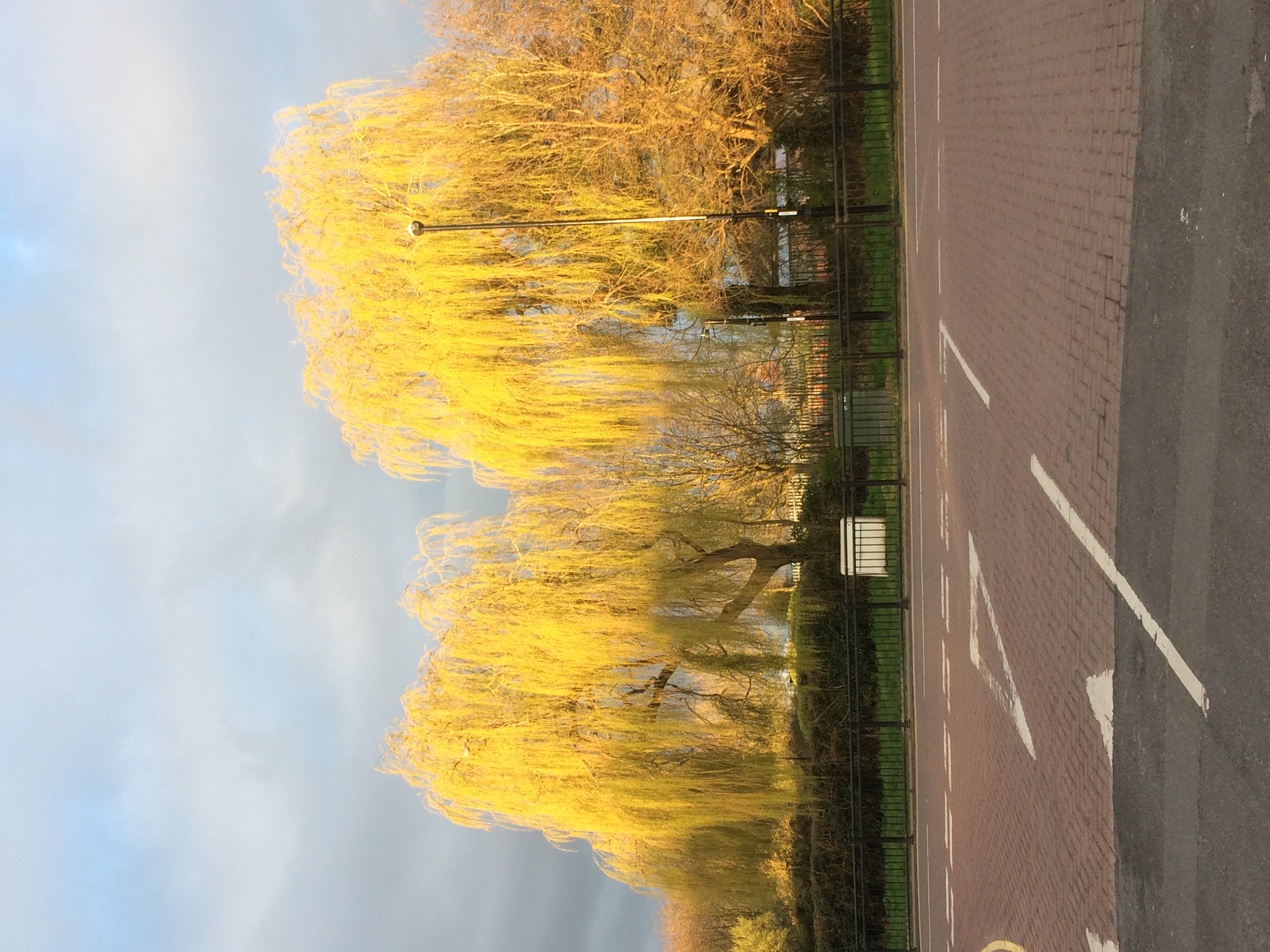
A lovely early mornig stroll, Green Lane, Coventry, March 2020. Photo: Anne Mofid
‘In these uncertain times, as so many of us are restricted in our travel, and with social distancing or self-isolation, DAWNS offers a moment of celebration, a time for us to feel we are together even when we are apart.
“Dawn is a magical time to experience the natural world. It’s an opportunity to notice nature awakening, to see and listen to what’s around us, as night passes into day.”- John Orna-Ornstein, Director of Culture and Engagement, The National Trust
‘The need of quiet, the need of air, the need of exercise and, I believe, the sight of sky and of things growing, seem human needs, common to all and not to be dispensed with without great loss.’ -Octavia Hill (1838-1912), Founder, National Trust
These are the words, sentiments, that, I, too, most passionately believe in. The only way that I can tell you about my 'Dawn-Time' happiness, my moments of unity with creator and creation, is to share the email I had sent to my family and friends from Crete, Greece, where we were on holiday in May 2019, which I have reprinted below.
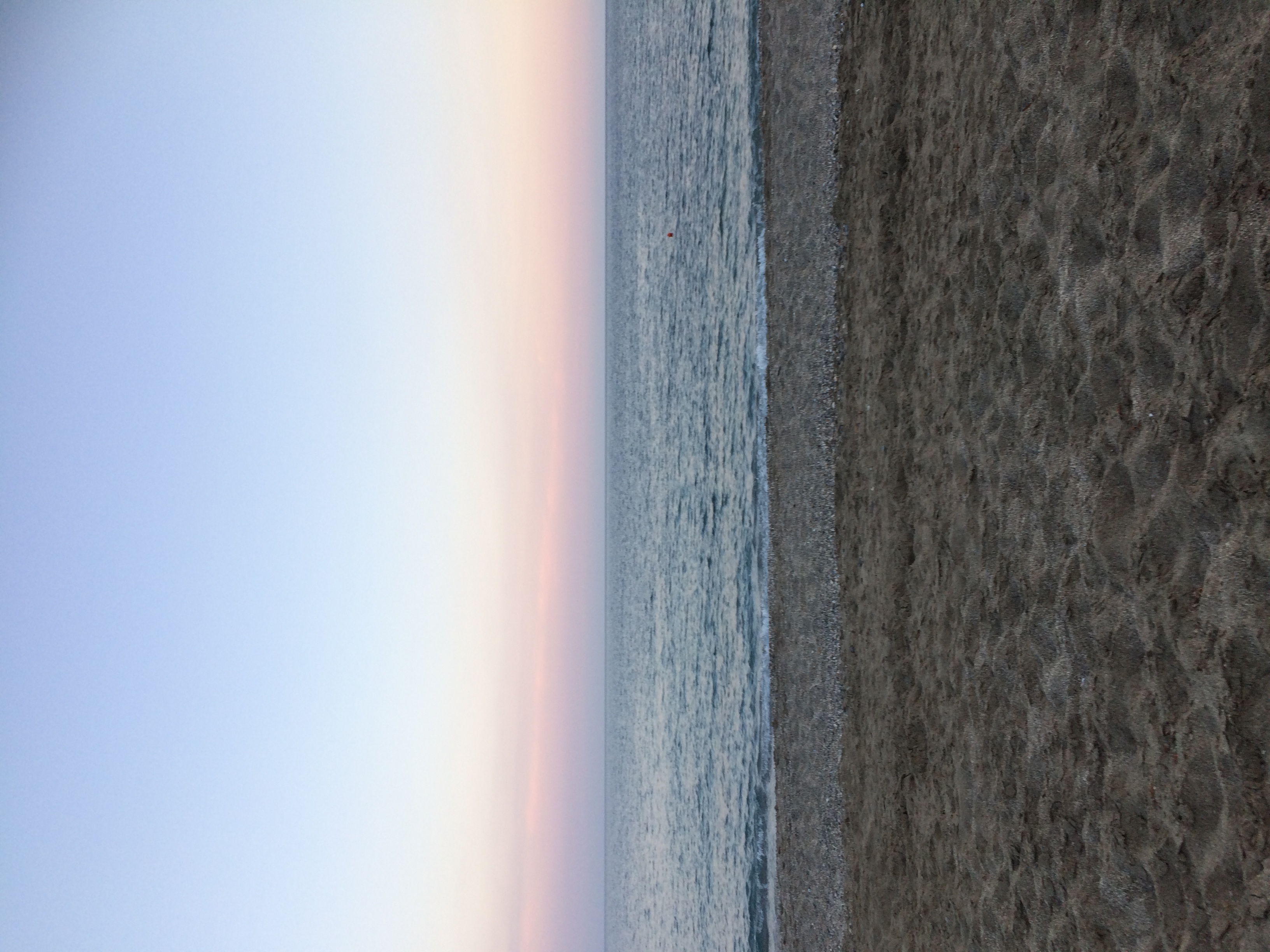
A beautiful sunrise from our Hapimag Resort apartment, Crete, May 2019. Photo: Anne Mofid
But before getting there, I want to share a bit more about ‘Dawn, sunrise, unity with creator and creation, etc.
Without a doubt, without any question, my most favourite thing to do is to be present at dawn at a place of total stillness, quiet, devoid of human presence, just me, myself and I, when I am not lonely, but immersed in the wonders of solitude. Thankfully, I am able to celebrate this time of day regularly, either in our relatively large conservatory, with lovely views of our garden, if it is raining, or sitting in the garden surrounded by a lovely scenery that my wife’s green fingers have created. A beautiful ‘English Garden.'
In this lovely, inspiring setting, dawn signifies a “shift change”. The creatures of the night return to their burrows and dens, getting their well-deserved rest. While creatures of the day emerge. Dawn is that “pointe vierge'' (‘virgin point’ as noted by Thomas Merton) when I hear birds greeting the sun with chirps and cackles, and begin to sing their dawn chorus.
In addition to setting a rhythm for Earth’s flora and fauna, dawn is the pattern in time that signifies the daily arrival of our highly complex energy source — the sun. An arrival of energy that is a highly connected to the necessities of life.
David Haskell in his wonderful book, The Forest Unseen, describes this special moment so beautifully:
‘The light and sound energies washing over the mandala find a point of convergence in my consciousness, where their beauty quickens a flame of appreciation. There is convergence also at the start of the energy’s journey, in the unimaginably hot, pressurized core of the sun. The sun is the origin of both the dawn’s light and birds’ morning songs. The glow on the horizon is light filtered through our atmosphere; the music in the air is the sun’s energy filtered through the plants and animals that powered the singing birds. The enchantment of an April sunrise is a web of flowing energy. The web is anchored at one end by matter turned to energy in the sun and at the other end by energy turned to beauty in our consciousness.’
Thus, in considering all these things and more, at Dawn we are taking a journey of adventure, exploration, and discovery. We are finding ways to find answers to some fundamental personal questions and inquiries: Who am I, where have I come from, where am I going to, what is the purpose of this journey we call life? For me, Dawn-time is the time to wonder and ponder about these and more. At Dawn we can ponder on how everything is connected. In doing so, we are engaging the very lifeblood of our Earth, of our humanity, our soul and being.
And now, reverting back to Dawn and my email from Crete:
Dear Friends,
Greetings and love from the loveliest Island of Crete. You know, about 20 years or so ago when I was going through some challenging times in my life, a loving friend, a wise teacher, encouraged me to get up early in the morning, at dawn, just before the sunrise. He told me Kamran, you will see a different world, a better world, a kinder world, a healing world, at that time of the morning. You will see the clouds dancing, the birds singing, the sky changing. You will see the dawn of a better life. WoW! How wise and correct my loving, wise friend has been, I must say. I have been getting up everyday at 5am, doesn’t matter where I am in the world. And I have never looked back. Today sitting in the balcony of our apartment here in Crete, surrounded by the most beautiful sea and mountains, waiting for the sunrise, listening to the birds, watching the light clouds dancing, I thought it makes me even happier sharing these feelings with you.
So my friends, please join me-wherever you are- in the spirit of beauty and healing, and begin your journey of Sun-gazing, an old method of healing. Our ancestors worshiped the sun for many good reasons, grandeur, peace, beauty, inspiration, wisdom, contentment, gratitude, healing, joy, hope, happiness, and the calming of the sounds of the awakening wilderness, when the birds are singing good morning to us all.
And also let us all rise to the calling of the first eco-warrior, the poet of nature, William Wordsworth, when he asked us ‘Let Nature be your Teacher’.
Join me at Dawn and let us together sing the praises of mother nature.
Together, we’ll get through this.
- Details
- Written by: Kamran Mofid
- Hits: 2149
I don’t know about you, but I get excited and joyful when, as an academic economic activist, I come across a CEO, a major business leader, whose views on what is good, converges with mine.
People like us, all of us, together will make the world great again
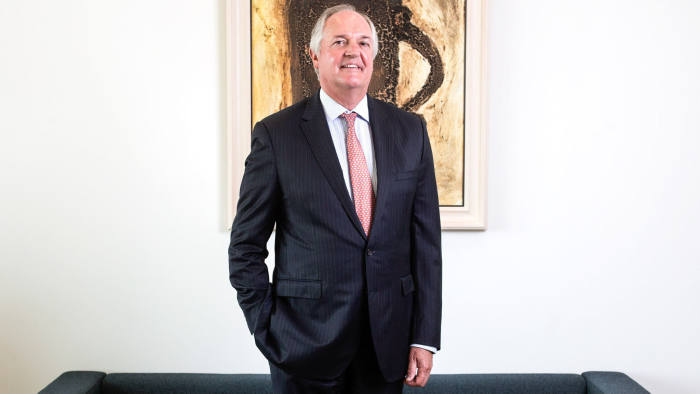
Paul Polman, Photo: Financial Times
‘We have ambitious plans to grow our company, creating jobs and income for all whose livelihoods are linked to our success. But growth at any cost is not viable. We have to develop new ways of doing business which will increase the social benefits from our activities’- Paul Polman, CEO, Unilever (2011)
'Mr Polman’s most significant contribution came from understanding just how badly business’s reputation had been damaged by the 2008 financial crisis and by the feeling of many that they had been left out of the supposed gains from globalisation and automation. He grasped the importance of talking to a younger generation about creating a more ethical and responsive business culture...'True leadership is putting yourself to the service of others and, if you can marry that with a very noble cause, to make this a better place for all.'... 'So if you buy into this long-term value-creation model, which is equitable, which is shared, which is sustainable, then come and invest with us. If you don’t buy into this, I respect you as a human being, but don’t put your money in our company, he once told his investors...'Mr Polman did not achieve all his goals — who of us does? But he helped create a new discourse that speaks to those disillusioned with business and its doings.'-Quotes from Michael Skapinker, Unilever’s Paul Polman was a standout CEO of the past decade, Financial Times, 11 December 2018
See also:Unilever CEO Paul Polman is redefining sustainable business

Photo: Uli Spalthoff
‘Globalisation for the common good will enable us to discover the urgent need for a new global ‘Bottom Line’. It will help us to acknowledge that the new bottom line must not be all about economic and monetary targets, profit maximisation and cost minimisation, but it should involve spiritual, social and environmental consideration. When practiced under these values, then, the business is real, viable, sustainable, efficient and profitable.
Therefore, the New Bottom Line that you should now believe in must read as follow:
Corporations, business leaders, politicians, government policies, our educational, legal and health care practices, environmental considerations, every institution, law, social policy and even our private behaviour and relationships, should be judged 'rational', 'efficient', or 'productive' not only to the extent that they maximise money and power (The Old Bottom Line) but ALSO to the extent that they maximise love and caring, kindness and generosity, ethical and ecological behaviour, and contribute to our capacity to respond with awe, wonder and radical amazement at the grandeur and mystery of the universe and all being.’- Kamran Mofid, Keynote Lecture, GCGI Dubai Conference, 2004
Imagining the World We Want and are Hoping For
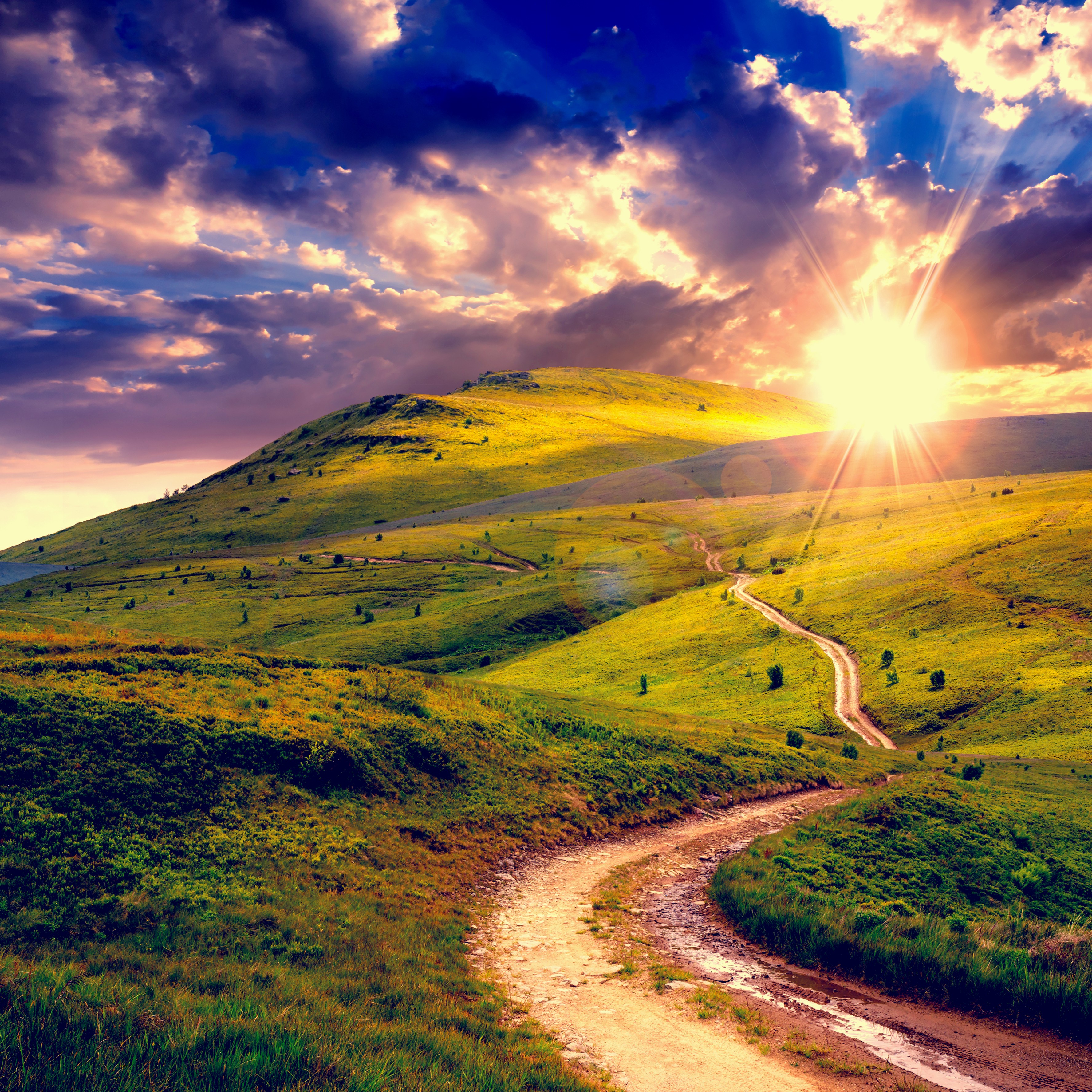
Photo: The Mission
Imagine a political system that puts the public first. Imagine the economy and markets serving people rather than the other way round. Imagine us placing values of kindness, respect, fairness, interdependence, and mutuality at the heart of our economy. Imagine an economy that gives everyone their fair share, at least an appropriate living wage, and no zero-hour contracts. Imagine where jobs are accessible and fulfilling, producing useful things rather than games of speculation and casino capitalism. Imagine where wages support lives rather than an ever expanding chasm between the top 1% and the rest. Imagine a society capable of supporting everyone’s needs, and which says no to greed. Imagine unrestricted access to an excellent education, healthcare, housing and social services. Imagine hunger being eliminated, no more food banks and soup kitchens. Imagine each person having a place he/she can call home. Imagine all senior citizens living a dignified and secure life. Imagine all the youth leading their lives with ever-present hope for a better world. Imagine a planet protected from the threat of climate change now and for the generations to come. Imagine no more wars, but dialogue, conversation and non-violent resolution of conflicts. Imagine a world free of corruption!
This is the country and the world I wish to see and I believe we have the means to build it, if we take action in the interest of kindness for the common good.- Kamran Mofid, What might an Economy for the Common Good look like?
Damaged ideology': business must reinvent capitalism – ex-Unilever boss*
Firms that take a lead on world’s biggest problems will be most successful, says Paul Polman
'Business needs to reinvent capitalism. We need to build a new model of inclusive and sustainable capitalism.'
‘A former boss of Unilever has said capitalism is a “damaged ideology” that must reinvent itself to survive by doing more to combat inequality and the climate emergency.
Paul Polman said companies that took a lead on the world’s biggest problems would be the most successful of the 21st century. Companies that put short-term profit ahead of long-term sustainability would not survive, he said.
“Capitalism, which has been responsible for the growth and prosperity that has done so much to enhance our lives, is a damaged ideology and needs to be reinvented for the 21st century,” Polman said in a speech. “Business needs to reinvent capitalism. We need to build a new model of inclusive and sustainable capitalism.”
...As chief executive of one of the world’s biggest consumer goods companies, he argued for businesses to take a long-term view on urgent matters such as global heating instead of prioritising profit.
Since leaving Unilever, Polman has invested in Imagine, a foundation to promote the UN’s sustainable development goals. He has also backed the young activists behind Extinction Rebellion and is a fan of Greta Thunberg.
Polman said there was a compelling business case for investing in the UN’s development goals with the opportunity to create at least $12 trillion (£9.3tn) a year in economic growth and generate 380m jobs.
“Companies with a strong sense of purpose are better able to grow not only revenue and profits but also create additional value, such as customer loyalty, attracting top talent and developing new products and services,” he told a dinner of business leaders held by the executive recruiter Odgers Berndtson. Companies must aim for “a next decade of delivery” to be a force for good, he said.
Despite Polman’s campaigning for more responsible capitalism while he was at Unilever, the company has only recently pledged to halve its use of plastics from 700,000 tonnes a year by 2025. His replacement, Alan Jope, has also said he will sell off brands that do not contribute to society or the planet.
Business leaders faced with unrest over the looming environmental disaster, social inequality and companies’ treatment of workers are trying to head off political interference by accepting that capitalism needs to change. In August, Apple, Amazon and the Wall Street bank JP Morgan were among 200 big US companies that redefined their purpose as “improving our society” and not only making money for shareholders.
Some of the world’s richest and most powerful businesspeople have warned that capitalism is failing. The hedge fund billionaire Ray Dalio has said the gap between rich and poor is an “existential threat” to US capitalism because it could lead to conflict, populism and “revolution of one sort or another”. Starbucks’ former chief executive Howard Schultz has said capitalism faces a crisis and has advocated higher taxes on the wealthy.
In Britain, the Labour party has committed itself to a target for the UK of net zero emissions by 2030 in its version of a Green New Deal. Labour has also pledged to extend workers’ rights, cap bosses’ pay at companies that provide services to the government and increase the minimum wage to £10 for all workers.’
*The above article by Sean Farrell was first published in The Guardian on 29 October 2019
A bit more on similar and relevant topics
Dreaming About Utopia to Make the World Great Again
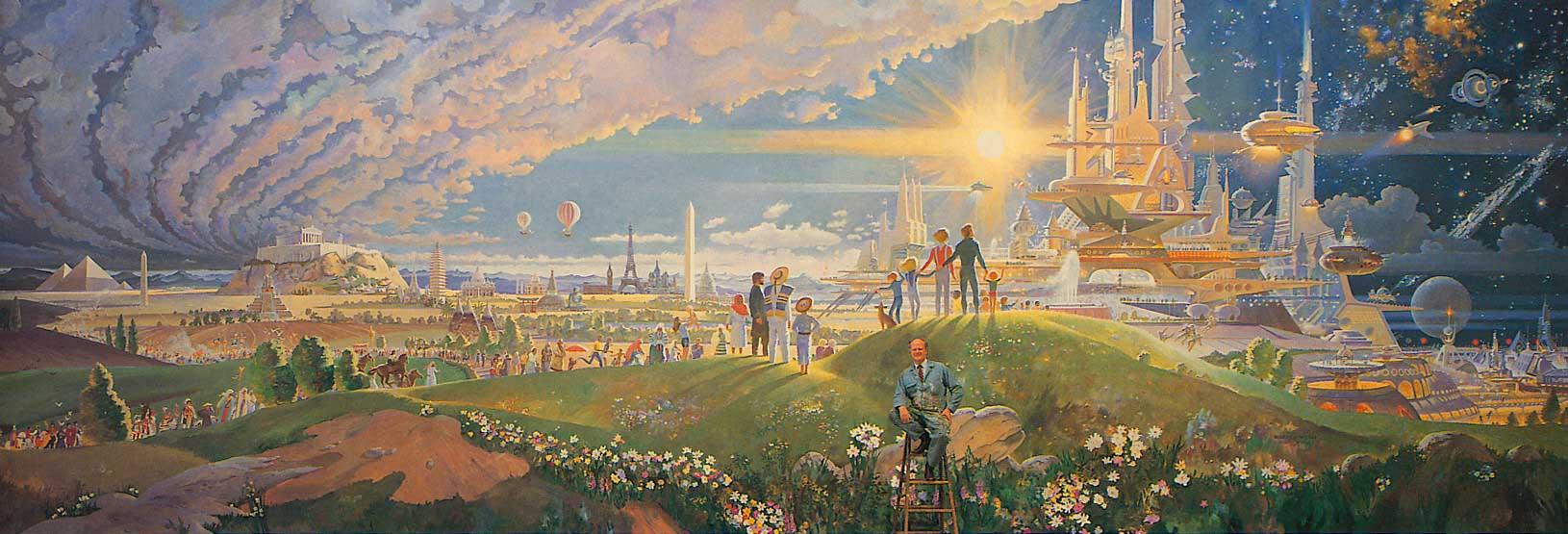
A version of Utopia from last century-Robert McCall 1983 Mural, The Prologue and the Promise-
Photo: mccallstudios.com
Dreaming about Utopia where we spend less time thinking about the Dow Jones and more time about contributing to the collective good
What is a perfect society, what is a good business and economy? What is a good life? What is a good person?
Reflecting on these and other similarly ‘Big’ questions, we seem to be able to achieve good and goodness in all we do, when and where our system is run by dreamers who call themselves realists. That is, hopefully, people like you and me!
For thousands of years human beings have dreamt of perfect worlds, worlds free of conflict, hunger and unhappiness. But can these worlds ever exist in reality?- Dreaming About Utopia to Make the World Great Again
To have the kind of world we are dreaming about and wish to build...we need to free ourselves from all the fear, pain, despaire, frustration, anger, and distortions that have led us to give up hope and has stoped us to imagine what the better world could look like.
What is the Value of MBA and Business Education?
The Value of Values: Values-led Education to Make the World Great Again
2008-2018 Crises: Have we learned anything?
Fat Cats: An invitation to dialogue
Life after Coronavirus: We Must Not Be Cheated and Exploited Again
...Now, and most importantly, the time is now to dump neoliberalism into the dustbin of history:
It is time for business leaders to move away from Milton Friedman's target of short term shareholder gain towards long term sustainability, says Paul Polman, the chief executive of Unilever.
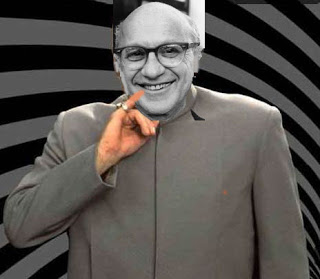
Photo: hubpages.com
“Paul Polman, the chief executive of consumer goods giant Unilever, is in a league of his own when it comes to being the leader of a multinational company challenging the corporate status quo. In a wide-ranging interview with Guardian Sustainable Business to coincide with the first annual update of the company's ambitious 10-year Sustainable Living Plan, Polman calls on business leaders, politicians and NGOs to embrace systems thinking, and to recognise they cannot deal with the world's environmental and social challenges in isolation.”
Reflecting on this interview, Gordon Pearson, the author of “The Road to Co-operation”, notes the following:
“Much of the totally unsustainable impoverishment faced today springs from that one simple untruth: the reckless depletion of finite resources, pollution of atmosphere and oceans, predatory activity of an unregulated financial sector, and the destruction of the real economy which provides real jobs as well as paying for education, health, defence and social security. All this destruction on the altar of shareholder wealth maximisation, is mirrored by the excessive bonuses and executive remuneration that are part of the daily news. No wonder, in his BBC lecture, Barclays CEO Bob Diamond lovingly claimed Milton Friedman to be his 'favourite economist'!
It is to be hoped that more will follow Polman's bold lead away from short term shareholder gain towards long term sustainability. But many firms are not strong enough to swim against the tide.
The Destruction of our World and the lies of Milton Friedman
Why Economics Needs the Common Good?
Is Neoliberal Economics and Economists 'The Biggest Fraud Ever Perpetrated on the World?'
Wouldn’t the world be a better place with a bit more kindness? Harnessing the Economics of Kindness
How may we build a better world?
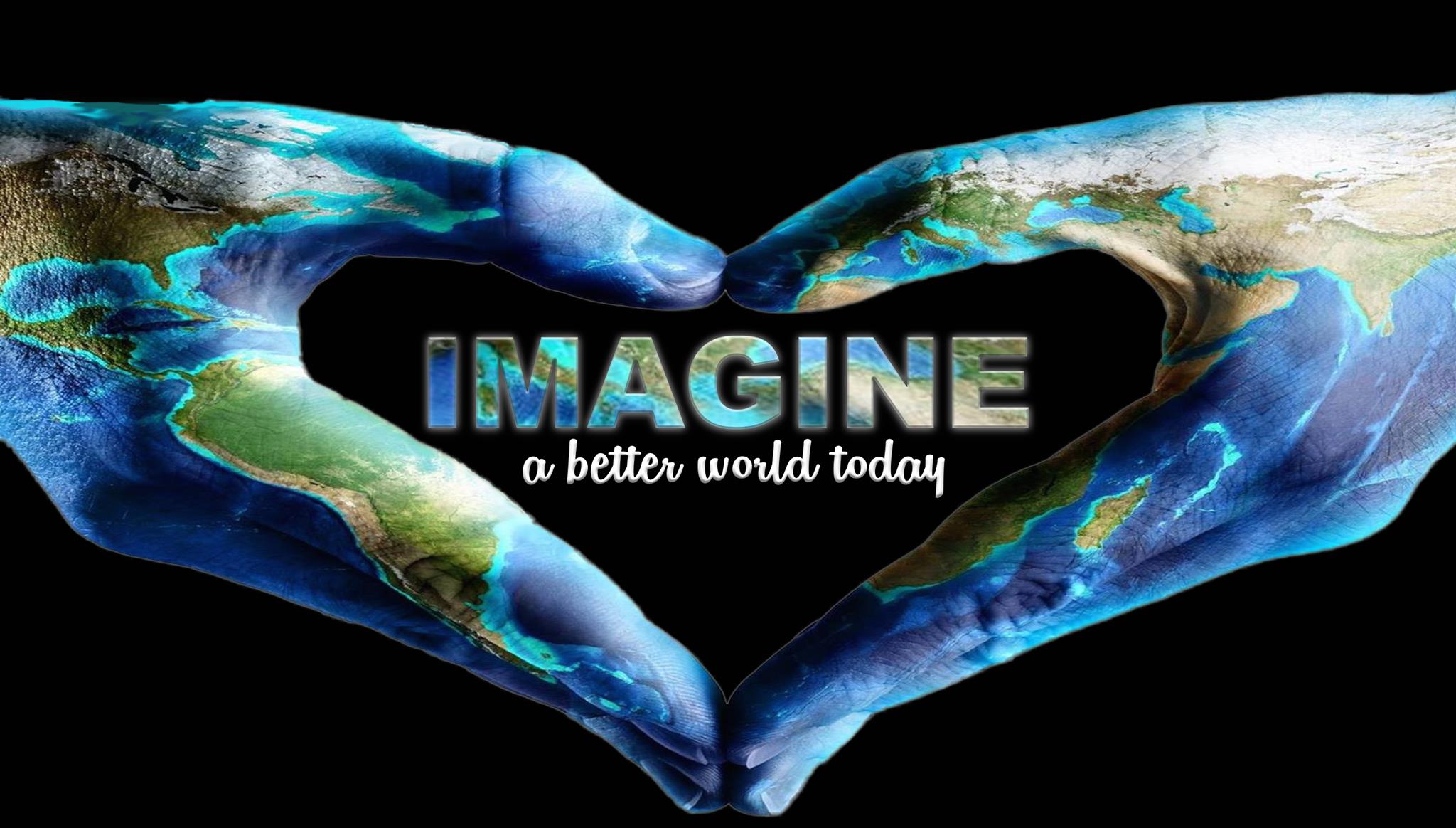
Photo: Facebook
The time is now to rediscover our true selves
‘Knowing yourself is the beginning of all wisdom.’-Aristotle
Unless we can reclaim our commitment to one another, we are not adhering to our humanity.
Beyond the Neoliberal, Thatcherite Wasteland: Ten Common Good Steps to Build a Compassionate and Kinder World
Call to Action
I believe in the power of service, volunteerism, empathy and actions in the interest of the common good to improve lives, to build a better world. I also believe that economic prosperity, ecological harmony, better lives and a kinder world are all possible, if we all acknowledge one thing: We are not only accountable to our shareholders, but and more importantly, we must be answerable to all the stakeholders and the entire web of life.
After all is said and done, it is not enough to simply talk about beliefs and principles; we must live up to them, be transparent and accountable, and continually find ways of improving.
At the GCGI, we want to continue and play our part in building a better world for everyone. I do know that I do not have all of the answers, and it is only by working with others and being open to new ideas and different perspectives that I can come up with possible solutions that global challenges require.
Below you can see my suggested Ten Steps to build a better world. Please share your thoughts, ideas, and insights with me. We can only build the better world we are seeking if we come together, work together, build together.
It’s time to deliver on the goals we’ve set for a more peaceful, resilient planet and a better life
Ten Steps to Build a Better World
Co-creating “The Future We Want” in the Interest of the Common Good
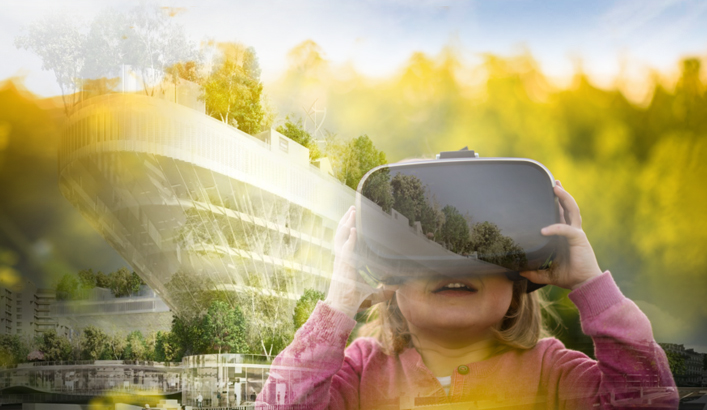
Photo: Arcadis
The future is indeed fraught with environmental, socio-economic, political, and security risks that could derail the progress towards the building of “The Future We Want”. However, although these serious challenges are confronting us, we can, if we are serious and sincere enough, overcome them by taking risks in the interest of the common good.
One thing is clear: the main problem we face today is not the absence of technical or economic solutions, but rather the presence of moral and spiritual crises. This requires us to build broad global consensus on a vision that places values such as love, generosity and caring for the common good into socio-political and economic practice, suggesting possibilities for healing and transforming our world.
Furthermore, I invite you to share a common belief in the potential of each one of us to become self-directed, empowered, and active in defining this time in the world as opportunity for positive change and healing and for the true formation of a culture of peace by giving thanks, spreading joy, sharing love, seeing miracles, discovering goodness, embracing kindness, practicing patience, teaching tolerance, encouraging laughter, celebrating diversity, showing compassion, turning from hatred, practicing forgiveness, peacefully resolving conflicts, communicating non-violently, choosing happiness and enjoying life.-Kamran Mofid
- Details
- Written by: Kamran Mofid
- Hits: 2209
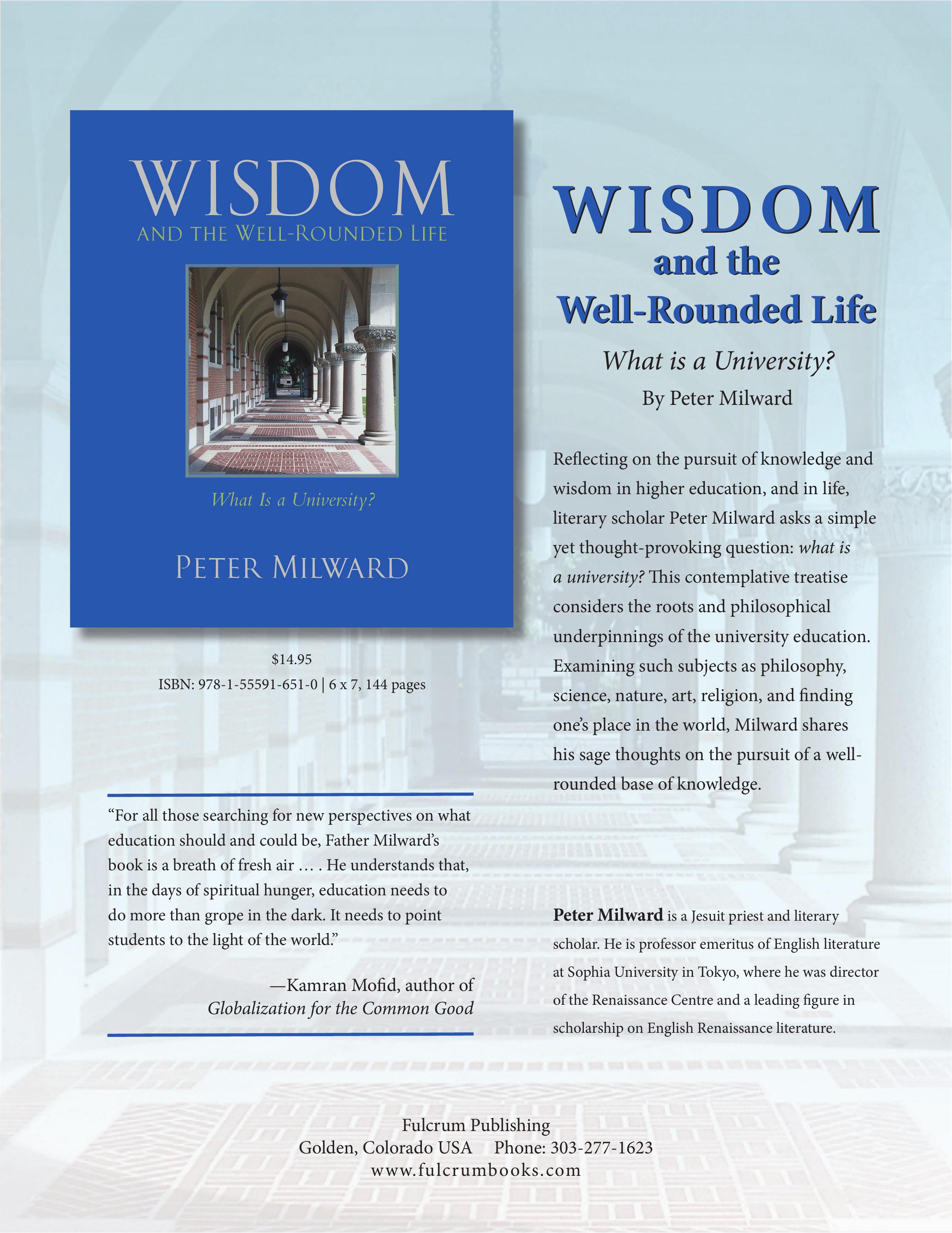
Fr. Peter Milward, My Friend and My Spiritual Mentor
‘As you will discover when you begin to read this book, he is a truly remarkable man. His charming innocence, universal compassion and thirst for true knowledge mark him out as a teacher in the great tradition of religious and philosophical sages who embrace the one universal truth. He is a giant among men, who truly deserves to be described as a Renaissance man, a friend to mankind and a bridge of reconciliation between cultures. It goes without saying that I was delighted and honoured when he asked me to write the Foreword to this book.’
Father Peter Milward, SJ (12 October 1925 London – 16 August 2017 Tokyo) was a Jesuit priest and literary scholar. He was emeritus professor of English Literature at Sophia University in Tokyo and a leading figure in scholarship on English Renaissance literature. He was chair of the Renaissance Institute at Sophia University from its inception in 1974 and director of the Renaissance Centre from its start in 1984. He primarily published about the works of William Shakespeare and Gerard Manley Hopkins.
A short story about When Kamran met Fr. Milward, SJ and the idea of What Is A Univerity
In 1999/2000 in search of life’s biggest questions in my struggles to become a different academic economist to what I had become, I began to study Pastoral Theology at Plater College- a Catholic adult education establishment- in Oxford. In 2001 I received a Certificate in Education in Pastoral Studies. In 2002 I authored and published Globalisation for the Common Good, which was mainly on globalisation and Catholic Social Teaching.
Soon after this publication I had a phone call from a conference organiser on An Interfaith Dialogue, which was going to be held at Campion Hall, University of Oxford, inviting me to the Hall for a meeting. I was delighted to discover that they wanted me to make a presentation based on my new book.
The three keynote speakers at that conference were Cardinal Francis Arinze, President of the Pontifical Council for Interreligious Dialogue, Archbishop Michael Fitzgerald, papal nuncio to Egypt and delegate to the Arab League, and Prof. Fr. Peter Milward, director, Renaissance Institute, Sophia University, Tokyo. I remember that day very fondly.
When the Conference was finished, somehow, Fr. Milward invited me for a coffee. I had a most wonderful and inspiring conversation with him and I was so happy that he also liked the book I had published.
Then a few months after the Camion Hall meeting, I convened the inaugural GCGI Conference on “An Interfaith Perspective on Globalisation” at Plater College. I was so happy that Fr. Milward accepted my invitation to participate at the conference. He gave a most fascinating talk on ‘The Globalisation of Shakespeare.’
Still more good news was on its way. I had a lovely letter from Japan. Fr. Milward was inviting me to spend a couple of weeks as resident scholar at Sophia University and the Renaissance Institute. Wow! I was feeling so happy, so excited.
I went to Japan. Fr. Milward had organised a series of lectures for me at Sophia, as well as at a number of think tanks, civil societies, religious, cultural and literary organisations and more in different locations across Japan.
Whilst in Tokyo, as well as when we were travelling on the Shinkansen, I had some of the most beautiful, enriching and inspiring conversations with Fr. Milward. It was then that he also told me he wanted to organise and arrange the translation of my book into Japanese and have it published in Tokyo, which he did.
Another topic of our long conversation was on education, universities, meaning and their meaningfulness, values and relavance. He shared many hand-written documents, manuscripts, etc with me. The more I read them, the more I discovered that they are truly a gem, words of wisdom, a treasure trove.
One evening, when I had been given the honour of having dinner with the Jesuit community at the Jesuit House at Sophia University, I don't know why, but I turned to Fr. Milward and said, Father, it would be a tradgedy if you do not put all these hand-written documents together and publish a book with a title of What is a University?
I also told him that, in that endeavour I could perhaps be of some assistance to him. I mentioned that I knew of a very good and ethical publisher in London, namely, Shepheard- Walwyn, who had published a few of my books, and ensured him of the excellent standards of its Editor-in- Chief, Anthony Werner. Fr. Milward listened carefully, but did not say anything.
A few days later, at Narita Airport, as I was leaving for London, he said to me that, (as best as I can recall) ‘Kamran, I am going to do as you suggested the other evening. I am coming to London next month. Please arrange a meeting for me with Anthony Werner. But now you must do a bit of work for me and write the Foreword to my book.’ The book was published in 2006, in London and again in the US in 2009 by Fulcrum under the title of ‘Wisdom and the Well-Rounded Life: What is a University?'
By now, Fr. Milward and I had become very good friends. He invited me again to Japan. And I was delighted when he came to a couple of our GCGI Annual Conferences, delivering Keynote lectures, notably in Dubai 2004 and Hawaii 2006.
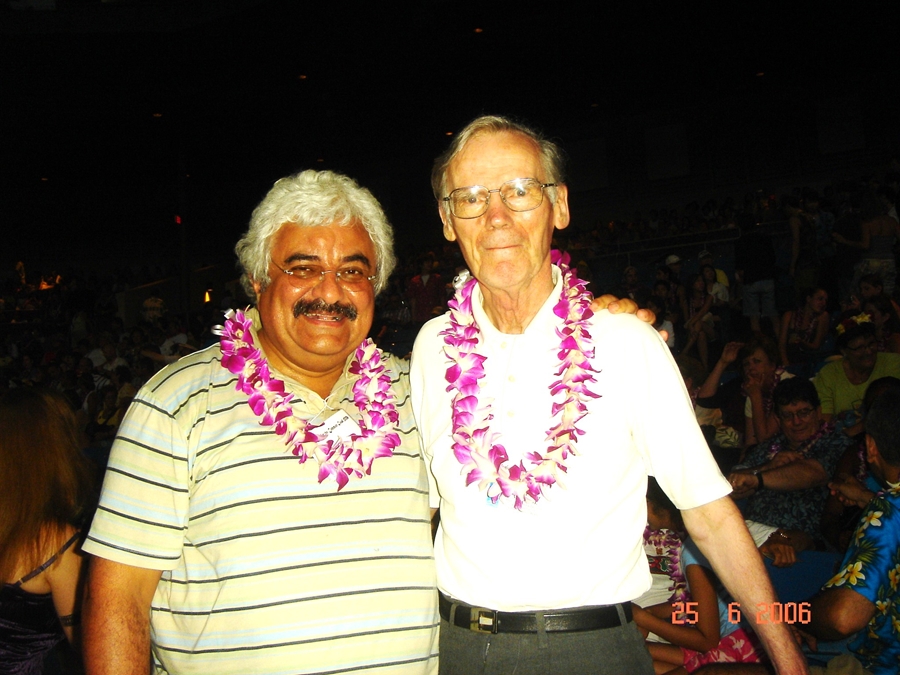
Fr. Milward on the right, Hawaii 2006, GCGI Conference. Photo: Anne Mofid
And now, Fr. Milward is gone. And I miss him so much.
He taught me many wonderful lessons. He told me that by respecting and valuing others, I would start to respect and value myself more fully. He taught me to love and enjoy the world, with all its wonders of diversity and beauty. He encouraged me to always take action in the interest of the common good. We also, on many different occasions, had the opportunity to share with each other our love and interest in old civilisations and cultures, especially Britain, Japan, and the land of my birth, Persia. I cannot be more thankful and grateful to him.
I can only say I have lost a great friend and mentor. I will never forget his loving smile, warm words and positive attitudes towards me. I am praying in my own way for my friend Peter and I ask The Almighty to ensure his continuous love for me to inspire me to do what I can for the common good. God grant Peter eternal rest; he was, in the old idiom, a lovely man, who, if required, may still be a peacemaker in heaven.
Wisdom and the Well-Rounded Life: What Is a University?
'Reflecting on the pursuit of knowledge and wisdom in higher education and in life, this thoughtful treatise considers the roots and philosophical underpinnings of university education. Examining such subjects as philosophy, science, nature, art, religion, and finding one's place in the world, Peter Milward shares his sage thoughts on obtaining a well-rounded base of knowledge.'
Read the Foreword and more details about What is a University HERE
- Life after Coronavirus: We Must Not Be Cheated and Exploited Again
- Coronavirus and the New Tapestry of Life: The time is now to rediscover our true selves
- Boris Johnson: This is How to Become a Force for Good
- Music for Hope on Easter Sunday from Milan Cathedral
- Coronavirus and Easter: Message Remains the Same
